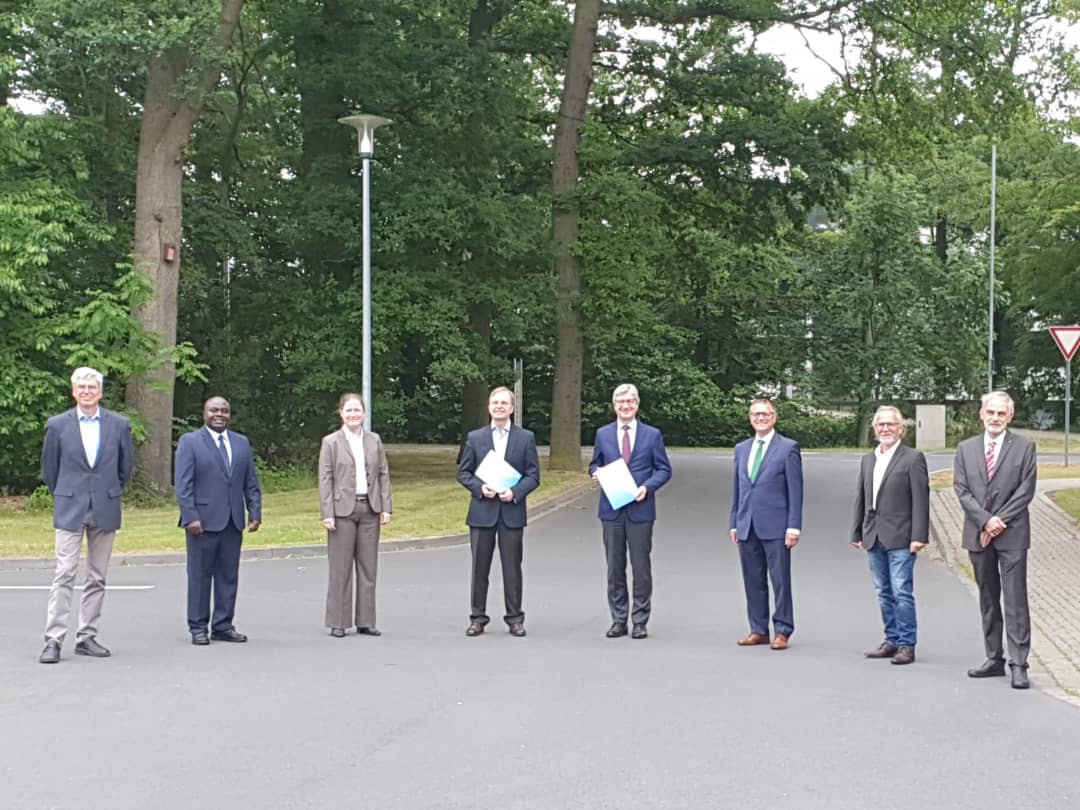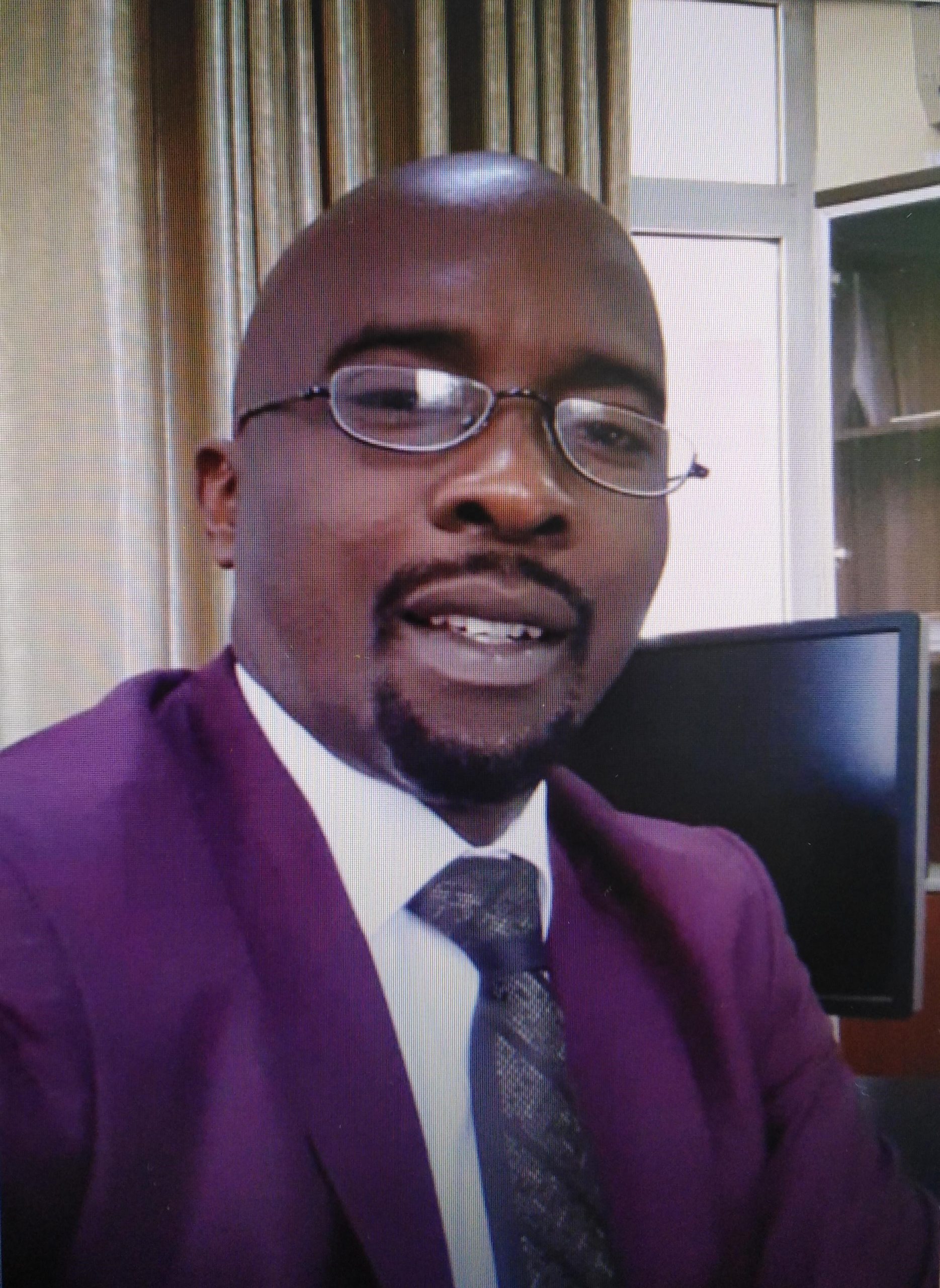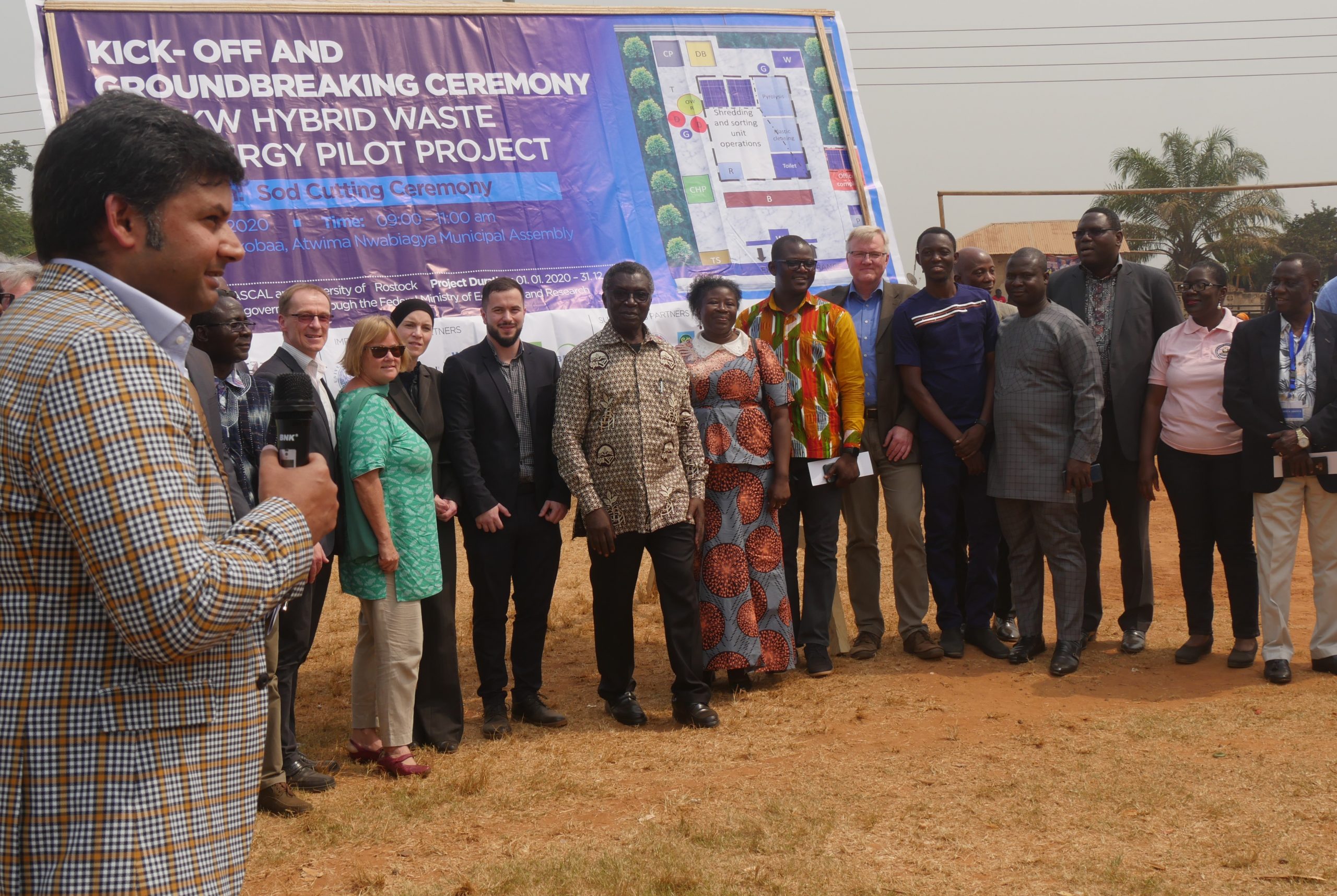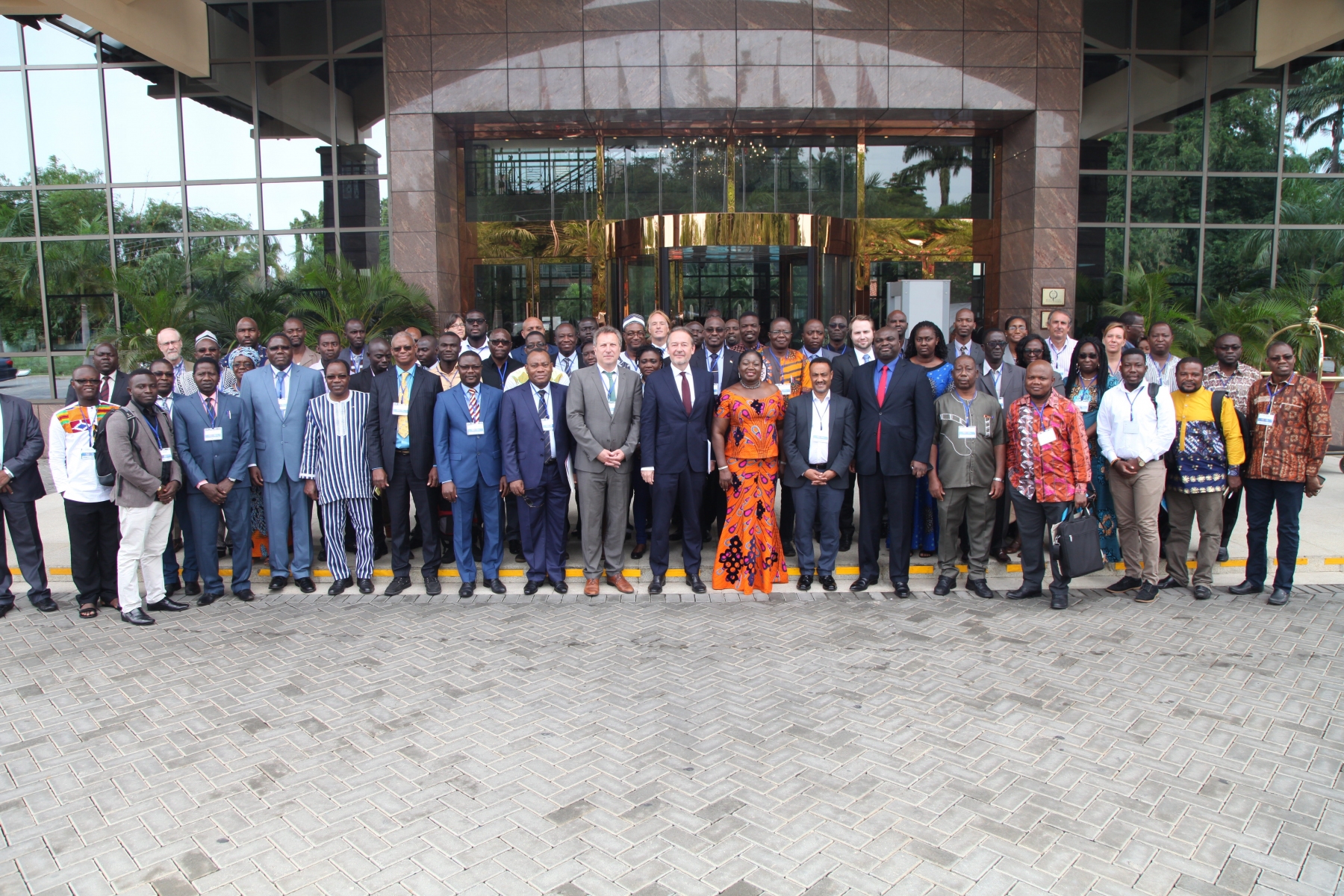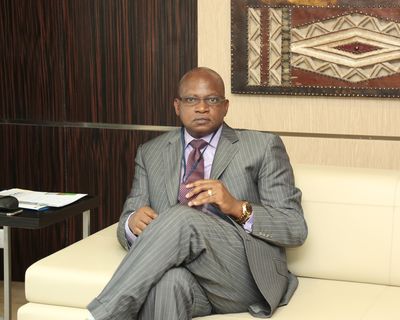Africa as a successful producer and exporter of sustainably produced hydrogen for a climate-neutral energy supply of the future: that is the idea behind the “H2Atlas-Africa” project. The central goal is Continue Reading
WASCAL has appointed Professor Kehinde Olufunso Ogunjobi as the new Director of Research at the WASCAL Competence Centre based in Ouagadougou, effective 3rd February 2020. As the Research Director, Professor Continue Reading
The kick-off and groundbreaking ceremonies for the Federal Ministry of Education and Research (BMBF) funded €5.8 million 400 kW Hybrid Waste to Energy (WTE) power plant construction to be situated Continue Reading
The German Federal Minister of Education and Research, (BMBF)Her Excellency. Prof. Anja Karliczeck will grace the 3rd WASCAL Ministerial Council Meeting scheduled to take place in Accra on 30th July,2019. Continue Reading
West African Science Service Centre on Climate Change and Adapted Land Use (WASCAL) has appointed Professor Jimmy Omoniyi Adegoke as its interim Executive Director. He takes over from Dr. Laurent Sedogo who for the past three years, was the Executive Director of WASCAL.
Prof. Adegoke’s appointment is a six-month executive management consultancy effective April 1, 2017. He will be the administrative head of the overall WASCAL organization and report to the Governing Board. Until this appointment, Prof. Adegoke was the Chair of the WASCAL Scientific Advisory Committee (SAC)
Prof. Jimmy Adegoke is a climate scientist and tenured Professor at the University of Missouri-Kansas City (UMKC) where he served as Chair of the Department of Geosciences from 2008 to 2010 and currently Director of the Center for Applied Environmental Research (CAER). He brings on board rich science management experience and world class expertise in the fields of international climate science and environmental systems spanning over 30 years.
He was previously Executive Director of the Council for Scientific & Industrial Research (CSIR) Natural Resources & Environment (NRE) Division, Pretoria, South Africa from 2010 to 2012, where he also served as the Director of the Applied Centre for Climate & Earth Systems Science (ACCESS), a Centre of Excellence (CoE) of the South Africa Department of Science & Technology (DST) Global Change Grande Challenge (GCGC) programme.
Prof Adegoke earned a Ph.D. in Geography with specialization in Climate Science from The Pennsylvania State University, USA. He also holds degrees from Ahmadu Bello University, Zaria (BSc) and the University of Ibadan (MSc), both in Nigeria.
Professor Adegoke maintains permanent residence in Kansas City where he was, until recently, an appointee of the Mayor of Kansas City Missouri (KCMO) on the city’s Environmental Management Commission (EMC). He holds dual citizenship in Nigeria and the United States of America.
WASCAL is a leading academic and trans-disciplinary research organization building graduate-level scientific capacity and serving policy makers in West Africa with science-based advice on adaptation to climate change impacts and land use management. It cooperates with many agencies and universities in the region, providing a knowledge platform of excellence for its partners. WASCAL is funded by the Federal Ministry of Education and Research (BMBF), Germany and its 10 West African member countries – Benin, Burkina Faso, Côte d‘Ivoire, The Gambia, Ghana, Mali, Niger, Nigeria, Senegal and Togo.
West African Science Service Centre on Climate Change and Adapted Land Use (WASCAL) has appointed Professor Jimmy Omoniyi Adegoke as its interim Executive Director. He takes over from Dr. Laurent Sedogo who for the past three years, was the Executive Director of WASCAL.
Prof. Adegoke’s appointment is a six-month executive management consultancy effective April 1, 2017. He will be the administrative head of the overall WASCAL organization and report to the Governing Board. Until this appointment, Prof. Adegoke was the Chair of the WASCAL Scientific Advisory Committee (SAC)
Prof. Jimmy Adegoke is a climate scientist and tenured Professor at the University of Missouri-Kansas City (UMKC) where he served as Chair of the Department of Geosciences from 2008 to 2010 and currently Director of the Center for Applied Environmental Research (CAER). He brings on board rich science management experience and world class expertise in the fields of international climate science and environmental systems spanning over 30 years.
He was previously Executive Director of the Council for Scientific & Industrial Research (CSIR) Natural Resources & Environment (NRE) Division, Pretoria, South Africa from 2010 to 2012, where he also served as the Director of the Applied Centre for Climate & Earth Systems Science (ACCESS), a Centre of Excellence (CoE) of the South Africa Department of Science & Technology (DST) Global Change Grande Challenge (GCGC) programme.
Prof Adegoke earned a Ph.D. in Geography with specialization in Climate Science from The Pennsylvania State University, USA. He also holds degrees from Ahmadu Bello University, Zaria (BSc) and the University of Ibadan (MSc), both in Nigeria.
Professor Adegoke maintains permanent residence in Kansas City where he was, until recently, an appointee of the Mayor of Kansas City Missouri (KCMO) on the city’s Environmental Management Commission (EMC). He holds dual citizenship in Nigeria and the United States of America.
WASCAL is a leading academic and trans-disciplinary research organization building graduate-level scientific capacity and serving policy makers in West Africa with science-based advice on adaptation to climate change impacts and land use management. It cooperates with many agencies and universities in the region, providing a knowledge platform of excellence for its partners. WASCAL is funded by the Federal Ministry of Education and Research (BMBF), Germany and its 10 West African member countries – Benin, Burkina Faso, Côte d‘Ivoire, The Gambia, Ghana, Mali, Niger, Nigeria, Senegal and Togo.
An African development pathway that could propel climate-resilient economic growth is possible if an enabling environment that promotes innovation and collaborative actions for climate change solutions is put into place, concluded a side event themed “innovations and African collaborative approaches for transformative climate policy solutions” at COP22 today.
Organized by the Africa Climate Policy Centre (ACPC) of the Economic Commission for Africa (ECA), the side event was an opportunity for experts to showcase a number of initiatives on collaborative research and capacity development, which included the Southern African Regional Universities Association (SARUA) Programme for Climate Change Capacity Development (PCCCD); and WASCAL (the West African Science Service Center on Climate Change and Adapted Land Use).
The SARUA Programme for Climate Change Capacity Development (PCCCD), has led to a consortium of seven universities from five SADC countries developing a regional Master’s curriculum in Climate Change and Sustainable Development, based on the principles of trans-disciplinarity and innovation; while WASCAL pools the expertise of ten West African countries and Germany to strengthen climate change research infrastructure and capacity. Ms. Penny Urquhart, Independent analyst and member of the SARUA Curriculum Review Team said there is a need for funding in order to scale up these initiatives to a continental scale to support Africa’s development aspirations, reduce vulnerability, increase resilience and optimise low-carbon options for growth.
Other speakers included Daouda Kone, Director of the WASCAL doctoral programme in Climate Change and Biodiversity, Université Felix Houphouet Boigny, Côte d’Ivoire; Dr Wilfran Moufouma Okia, Head of Science, Technical Support Unit, IPCC and; Professor Roland Roesch, Senior Programme Office, International Renewable Energy Agency (IRENA). The event was moderated by Mr Linus Mofor, ACPC Senior Natural Resources Officer responsible for energy, infrastructure and climate change.
In summing up the session, Ms Simbisai Zhanje, Project Manager at the Climate and Development Knowledge Network (CDKN) said that while capacity is important, capability is equally significant as the context in which implementation takes place can be an enabler or barrier. “Political will is an important capability factor in different contexts.” she added.
Distributed by APO on behalf of United Nations Economic Commission for Africa ( UNECA ).
Powered by EIN Presswire
Distribution channels: Environment, Media, Advertising & PR, World & Regional
EIN Presswire does not exercise editorial control over third-party content provided, uploaded, published, or distributed by users of EIN Presswire. We are a distributor, not a publisher, of 3rd party content. Such content may contain the views, opinions, statements, offers, and other material of the respective users, suppliers, participants, or authors.


